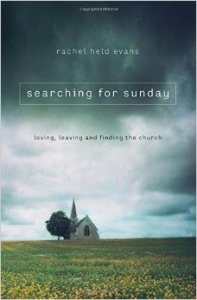 Searching for Sunday: Loving, Leaving, and Finding the Church
Searching for Sunday: Loving, Leaving, and Finding the Church
by Rachel Held Evans
Pub Date: April 14, 2015
I love reading about people’s faith journeys. If they return to faith, if they turn away from faith, if they have answers by the end or more questions, if they’re of my faith or not. I love reading them. Expect to find more of them featured on this blog in future. What I appreciate about them is identifying with the author’s struggles, coming to terms with my own doubts and questions, and being able to better frame my own beliefs from wrestling with theirs.
I discovered Rachel Held Evans three years ago when her previous book, A Year of Biblical Womanhood, came out. I devoured that book, and it was like a big light bulb appeared over my head when I read it. (I will definitely review this one in future.) She’s a Millennial Christian, a smart woman raised in an academic, theological home, who opens herself up to plenty of discussions about faith. So I was very excited to learn through her blog that she was working on a new book, and eagerly anticipated its arrival. I read two chapters, and then I had to put it down for a bit. I guess I needed to be in the right frame of mind to really get into it, and the past couple of weeks it’s been part of my Sunday reading. For me, I couldn’t read it in one sitting – I needed time for it to digest.
Evans details her struggles with the evangelical faith she was raised with. For many readers, this may be very familiar territory, and for others this may be more eye-opening. As a person of LDS background approaching this title, there are a number of doctrinal differences, but I still noticed quite a bit of overlap with some of the cultural practices. Some of these episodes I recall reading on her blog, or in her past books. Here she organizes her book, and her faith journey, following the seven sacraments as used in some Christian traditions of baptism, confession, holy orders, communion, confirmation, anointing of the sick, and marriage. For someone heartily raised LDS (I tend to say “both sides go back to Nauvoo”), this seems familiar and yet unfamiliar. But overall there’s a sense of familiar with her stories of culture, her questions of doctrine and practice, and in the people she meets along the way.
…we long for our churches to be safe places to doubt, to ask questions, and to tell the truth, even when it’s uncomfortable. […] We want to bring our whole selves through the church doors, without leaving our heart and minds behind, without wearing a mask.
To be quite honest, I kept thinking of President Uchtdorf talks through reading a lot of this book, particularly a CES Devotional entitled “What Is Truth?,” and “The Gift of Grace” from our last General Conference. No doubt other talks and stories will come to your mind, but these are what kept returning to my mind as I read.
One of the big takeaways for me was how we, collectively as Christians, need to be more aware of how we tote the name “Christians.” Evans observes some very un-Christlike behavior in some, and exceptionally Christlike behavior in others, and what would you want to be remembered in someone’s memoir for? I recall a former roommate of mine saying when she first converted she attended some Sunday blocks where there was no mention of Christ. None. The speakers and teachers certainly touched on gospel topics, but Jesus was not among them. And she’s made it a point ever since to always bring up Christ in whatever talk or lesson she gives, and I think that’s a great rule of thumb. This was a thought that came to me a few times while reading. How am I bringing Christ into the conversation?
This is definitely a book to read with a pencil handy to mark passages. I found many that I found inspiring, “Faith is about feeding as well as being fed” and “I can’t be a Christian on my own. Like it or not, following Jesus is a group activity” being some of them. This is a book to engage with – to not only hopefully gain some spiritual solace and confirmation of struggles, but also to take this person’s definitions of Christianity and see how it holds up to ours. That’s what I like about books from those of another faith – gaining on new perspective on my own.
This book is a nice, lighter addition to your gospel studies, if to just give you another point of view. Checkout Rachel Held Evan’s blog or Twitter for plenty more food for thought. And though I did not read along with the study guide, Evans provides one on her blog that may make the reading more fulfilling.
